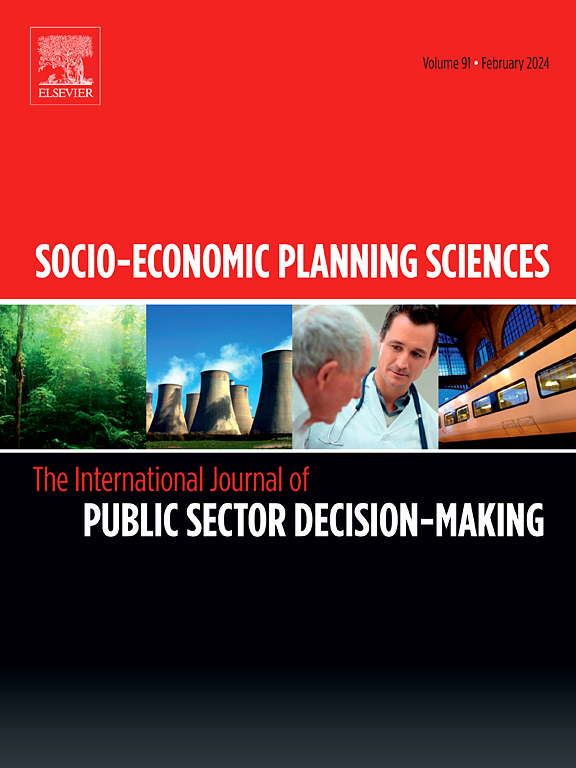Stability and optimisation of financing strategies for blue pharmacy cultivation in China
IF 5.4
2区 经济学
Q1 ECONOMICS
引用次数: 0
Abstract
‘Blue pharmacy’ refers to the rich medicinal resources nurtured in the oceans, whose cultivation is crucial for promoting the prosperity of the marine biomedicine industry, and enhancing human health and wellbeing. However, blue pharmacy cultivation requires more patient capital than other industries, severely limiting its development. This study analyses the funding problems at the initial stage of the creation of blue pharmacy, and proposes corresponding solutions using gaming and system dynamics. The results show that: (1) In an iterative battle between the three stakeholders, the actions of the blue pharmacy industry and government are largely influenced by the decisions of financial institutions, who choose their own strategies based on the blue pharmacy industry's actions. The industry's profitability does not change the government's determination to continue supporting the development of blue pharmacy. (2) A non-linear dynamic investment scheme is more conducive for the government's macro-control of the blue pharmacy industry, which not only solves the problem of the system's oscillatory fluctuations but also enables it to reach the ideal equilibrium state more quickly. (3) Regardless of whether financial institutions finance blue pharmacy, the amount of government investment influences the strategic choices of both the blue pharmacy industry and government. Crucially, it also indirectly influences financial institutions' strategic choices by influencing the government's strategic choices. Therefore, the amount of government investment is crucial in influencing the system's balance, which this study illustrates using simulations. Finally, our findings not only provide decision support and theoretical guidance for the decision-making in the financing system for the blue pharmacy industry, but also provide strategic insights for the government to formulate effective incentive policies for the development of blue pharmacy.
中国蓝色药房培育融资策略的稳定性与优化
“蓝色药房”是指海洋蕴藏着丰富的药用资源,其培育对促进海洋生物医药产业繁荣、增进人类健康和福祉至关重要。然而,蓝色药房的培育比其他行业需要更多的患者资本,严重限制了其发展。本研究分析了蓝色药房创建初期的资金问题,并运用博弈论和系统动力学的方法提出了相应的解决方案。研究结果表明:(1)在三方利益相关者的博弈博弈中,金融机构的决策在很大程度上影响着蓝色医药行业和政府的行为,金融机构根据蓝色医药行业的行为选择自己的策略。行业的盈利能力并没有改变政府继续支持蓝色药房发展的决心。(2)非线性动态投资方案更有利于政府对蓝色医药产业的宏观调控,既解决了系统的振荡波动问题,又使其更快达到理想的均衡状态。(3)无论金融机构是否为蓝色药房提供融资,政府投资的多少都会影响蓝色药房行业和政府的战略选择。至关重要的是,它还通过影响政府的战略选择间接影响金融机构的战略选择。因此,政府投资的多少对影响系统的平衡至关重要,本研究通过模拟来说明这一点。最后,本文的研究结果不仅为蓝色药房行业融资体系的决策提供了决策支持和理论指导,也为政府制定有效的蓝色药房发展激励政策提供了战略见解。
本文章由计算机程序翻译,如有差异,请以英文原文为准。
求助全文
约1分钟内获得全文
求助全文
来源期刊

Socio-economic Planning Sciences
OPERATIONS RESEARCH & MANAGEMENT SCIENCE-
CiteScore
9.40
自引率
13.10%
发文量
294
审稿时长
58 days
期刊介绍:
Studies directed toward the more effective utilization of existing resources, e.g. mathematical programming models of health care delivery systems with relevance to more effective program design; systems analysis of fire outbreaks and its relevance to the location of fire stations; statistical analysis of the efficiency of a developing country economy or industry.
Studies relating to the interaction of various segments of society and technology, e.g. the effects of government health policies on the utilization and design of hospital facilities; the relationship between housing density and the demands on public transportation or other service facilities: patterns and implications of urban development and air or water pollution.
Studies devoted to the anticipations of and response to future needs for social, health and other human services, e.g. the relationship between industrial growth and the development of educational resources in affected areas; investigation of future demands for material and child health resources in a developing country; design of effective recycling in an urban setting.
 求助内容:
求助内容: 应助结果提醒方式:
应助结果提醒方式:


